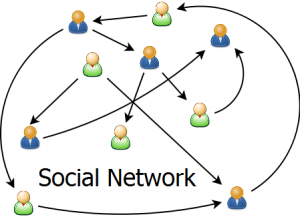
It seems as if everyone we know has a social media account these days since it allows family and friends to easily connect from different places all over the world. Let’s face it, social media usage has gone up at least 10,000% the past 2 years. From Facebook to Twitter, there are thousands of sites where people interact and share with one another all sorts of videos, files, documents and more. However, there are many social media and other file sharing dangers that most people don’t really know about or pay enough attention to.
P2P (Peer-to-peer) File Sharing
Years ago a P2P program called Kaaza came out on the Internet and it immediately became an overnight success with users. People were finding millions of files being shared by users remotely from all over the world. From movies, software and songs, there wasn’t anything you couldn’t find on Kaaza or similar sites; and all for free. However, hackers soon invaded these sites and began to upload files filled with malicious virus and trojan horses. The programs also began to collect private user data and practically took over your computers. Most of the P2P programs actually were sending out emails through your own computer without users even knowing about it. Millions of computers and laptops were infected and people soon began to realize the dangers P2P programs presented.
Anyone who has P2P software installed on their PC or devices should be very careful, especially if you are using it at the workplace. One of the easiest forms of hacking someone comes via P2P sharing. Chances are that those costly programs and files you are finding for free on P2P networks may end up costing you much more in the end. Always use caution and examine the files you download with an antivirus program before opening them.
You must also read on the Dangers Of Downloading Free Files From The Internet
Dangers of Flash Drives
Flash drives have made our lives so much easier when it comes to file sharing. However, they are extremely risky and are one of the most commonplace tools for infections and virus. This is because flash drives bypass network security when you run them. Some have an autorun on them which makes it even worse to control. The minute you insert a flash drive into your device, it can start a virus to run and infect your computer in seconds. It can spread from your PC and disable security programs as well. Just like files you download from the internet, always check flash drives for infections and viruses.
Email File Sharing
We all receive thousands of emails a month, depending on your email program. Because of this, sharing files via emails is one of the most dangerous and quickest forms for users to get their devices hacked or breached. Emails are not designed to be secure so they can easily be manipulated to act as a trojan horse by hackers. If you receive an email with a file attachment then be super careful when opening it. Even if these files are from friends or family members, use caution. Most hackers will hack your device and send out emails to those on your contact list to make it appear as if the emails are legit and coming from you. By the time the others realize what has happened, they too have also been hacked. Using file sharing services is always best if you send out files or receive some from friends, co-workers of family members. Most bogus or dangerous emails will come with really catchy or eye grabbing subject lines to induce you into opening them. If in doubt, it is always prudent to simply delete them.
Cloud File Sharing
Last year, over 2 Billion dollars were lost to hackers by businesses whose employers ended up using some sort of cloud file sharing services. Sites such as Google Drive and Dropbox are awesome to use since they make file sharing so much easier. However, they also open up a plethora of security risks for users. Some people just love sending out files to others and fwd them. Still, often times these files being shared can easily be modified by a user on the list while they end up adding some malicious virus or trojan to the original document or file. Many companies are now using professional grade file sharing services for their employers and are forbidding them from using consumer grade programs to avoid being breached. Be sure to follow your employer’s security protocol when using a company’s computer lest you lose your job behind sharing or receiving files from others.
Worried about your files? Then check out these Tips on Protecting Important Files
In all reality, file sharing can be great and has made our world so much easier when it comes to sharing files all over. Social media is a great tool as well since we can all share files all day long and see or get files we would never had been able to do so before. However, it can also end up costing you or others your personal data and information if you’re not careful. Use caution and be fervent security wise in your file sharing usage.

Follow us